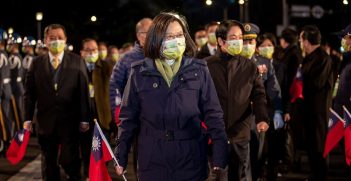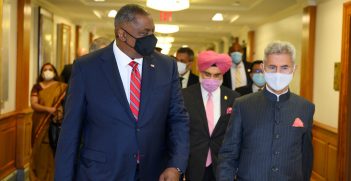Aligning Canadian Interests with the Geopolitical Realities of US-China Strategic Competition

Canadian foreign policy and its position globally is in crisis. It has faced numerous shocks to its middle power identity, traditional friendships, and long-term relationships.
When it comes to the United States, the Trump administration and its bullying tactics employed to renegotiate the NAFTA 2.0 was a wake-up call for policy makers in Ottawa. Under the Biden administration, new legislation such as the CHIPS Act to limit technology flows into China will complicate Canadian businesses, Canadian prosperity, and Canada’s ability to engage in the Indo-Pacific region, and with important countries like China in a less strategically autonomous manner.
China has also delivered a series of shocks to Canada. The hostage diplomacy that was practiced following the arrest of the Huawei executive Ms Meng Wanzhou, political interference allegations, and threats to Canadian parliamentarians along with sanctions on Canadian products coming into China have painfully demonstrated that Canada’s long-term engagement with China was vulnerable to the weaponisation of supply chains, visiting scholars, and businesspeople among other forms of coercion.
Last but not least, the recent accusations towards the Indian Government about direct involvement in the killing of a Canadian citizen of Indian origin has also shaken Canada’s foreign policy engagement. Canada is now faced with the unenviable conundrum of how to implement its new Indo-Pacific Strategy when relations with India are at record lows.
Canada’s middle power identity, one that advocates for human rights, international law, and human security – so-called normative paradigms – has resulted in isolation and questions over the relevance of Canada to our traditional allies. It also raises questions about Canada’s ability to contribute to global governance and mitigating challenges such as non-traditional and traditional security challenges in the Indo-Pacific, the Middle East, and in war zones such as the Ukraine.
This isolation and questions over relevance and reliability is well illustrated by Canada not being a second, or even a third choice for the Quadrilateral Security Dialogue (Quad), AUKUS, and the Indo-Pacific Economic Framework (IPEF).
Even the muted silence following the assassination of a Canadian citizen on Canadian soil by the Five Eyes members suggests that Canada is not seen as a priority partner in dealing with 21st century great power politics and the challenges associated with the US-China relationship, and also Russia.
Canada requires a sober assessment of its resources, its place in the world, and its traditional middle power identity that was founded on a value-based approach to Canada engaging regionally and globally.
To be an effective, sustainable, and meaningful partner to like-minded states such as the US, Japan, South Korea, Australia, and European states, an interest-based approach to middle power engagement will be critical to manage and secure strategic autonomy and reliability within minilateral relationships such as the Quad, AUKUS, etc.
This middle power reset, transformation or evolution, will necessarily require Canada to jettison evangelistic approaches to foreign policy that focus on human rights, democracy promotion, and cultural issues in lieu of a foreign policy deeply wedded to securing Canadian national interests in respective regions globally.
In the context of the Indo-Pacific, Canada’s national interests are at least threefold. This first is locking Canada into the rulemaking process of this rapidly evolving region. This means being part of trade agreements like the Comprehensive and Progressive Transpacific Partnership (CPTPP), trade frameworks such as IPEF, the regulation of AI, and developing the technologies that will transform economies, the relationships between government and its citizens, as well as the promotion of good governance.
Without being at the rules-setting table in the region and part of major trade agreements, Canada will not be able to deliver prosperity to Canadians.
Second, Canada has a vested interest in contributing to mitigating non-traditional security challenges such as climate change, transnational diseases, transnational illegal migration, piracy, and cybersecurity challenges that are emanating out of rogue states such as North Korea. These non-traditional security challenges also emanate from revisionist states, terrorist groups, and non-state actors that deploy disinformation proactively to sow discord, divide and to co-opt our democratic form of government, and breakdown our rule-oflaw based system.
At the forefront of these challenges is China and Russia. However, and in the wake of Hamas’ attack on Israel, we have seen terrorist organisations deploy disinformation to drive discord between like-minded democratic states.
Third, traditional security is also a critical area for Canada, along with the much needed middle power reset in the Indo-Pacific. Sea lines of communication (SLOC) and airways are all being challenged by revisionist states. Illegal entry into Air Defense Identification Zones (ADIZ), unsafe naval and air maneuvers, and the use of grey zone and lawfare tactics are elevating the chance for conflict in the South China Sea, East China Sea, and across the Taiwan Strait.
This could disrupt the more than US$5.5 trillion of imports/exports and energy resources that flow through the SLOC in the Indo-Pacific, not to mention damage the economic power houses in the region.
Canada’s policy strategy toward traditional security issues in the Indo-Pacific, the Ukraine, and the Middle East needs a sober assessment of the realities of the resources that it can bring to bear to these regions.
Key questions that need to be addressed are: how sustainable is the provision of military resources to zones of conflict or instability? And are there are other means available to provide capabilities to deal with security challenges in these regions?
Here, Canada has a demonstrated track record of working within North American Aerospace Defense Command (NORAD), NATO, and the NEON Operations in the Sea of Japan which act as tools to enforce UN mandated sanctioned evasion policies against North Korea.
Canada simply does not have the resources to manage a large military footprint in the Indo-Pacific, the Atlantic, and a growing threat zone across the Arctic. A capabilities-based approach to adding value to the Indo-Pacific region’s security challenges will necessarily mean participating as a plugin or secondary partner within existing minilateral relationships. Key examples are the Quad and AUKUS, as well as emerging minilateral relationships such as the Japan-ROK-US Camp David Principles-based minilateral or others.
As Canada reflects on how to manage the geopolitical realities of the US-China Strategic competition it will be critically important to work with partners and allies to lobby, insulate, and influence an increasingly politically unstable United States such that their foreign policy reflects the interests of partners and allies of the United States. Key partners will include Japan, South Korea, Australia, New Zealand, European countries, as well as others.
In dealing with China, and the growing track record of economic coercion, hostage diplomacy, disinformation, and political influence tactics Canada will have to expand its cooperation with like-minded countries to insulate itself from the weaponisation of trade, supply chains, education, and exchanges, among others.
At the same time, effective engagement with China will require a more disciplined, nuanced, and interest-based approach to securing the real benefits that exist with a strong, robust trade relationship with China, as well as a relationship that is balanced and well diversified within the broader Indo Pacific region.
Stephen is a Professor at the Department of Politics and International Studies at the International Christian University. Concurrently, he is a senior fellow at the MacDonald Laurier Institute (MLI), a fellow the Canadian Global Affairs Institute (CGAI); a senior fellow with the East Asia Security Centre (EASC); and a visiting fellow with the Japan Institute for International Affairs (JIIA).
This article is published under a Creative Commons License and may be republished with attribution.





